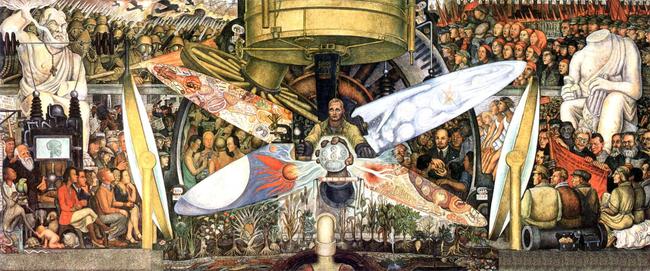 An Argument
An Argument How do we understand ideas like scientific materialism?
"If your past is your experience, make the future sense and vision!"
Seven great challenges of modernity
- Reformation -- challenge to authority
- Scientific Revolution -- challenge to reason
- Mechanization & industrialism -- organizational challenge
- French Revolution & nationalism -- challenge to privileges
- Imperialism & ethnic discrimination -- challenge to justice
- Evolution -- challenge of a commonality of descent
- Socialism and Fascism -- challenge of tolerance
In every case vast bodies of knowledge underwent profound change and the assurances about what a human being is and the duty of our being entered prolonged periods of uncertainty completely altered by the tide of events, inventions and discoveries.
For example as Carl Jung wrote:
"Under the influence of scientific materialism, everything that could not be seen with the eyes or touched with the hands was held in doubt; such things were even laughed at because of their supposed affinity with metaphysics. Nothing was considered “scientific” or admitted to be true unless it could be perceived by the senses or traced back to physical causes. This radical change of view did not begin with philosophical materialism, for the way was being prepared long before. When the spiritual catastrophe of the Reformation put an end to the Gothic Age with its impetuous yearning for the heights, its geographical confinement, and its restricted view of the world, the vertical outlook of the European mind was forthwith intersected by the horizontal outlook of modern times."
Modern Man in Search of a Soul, 1933. Published by Routledge & Kegan Paul, translated by Cary Baynes. Reproduced here, Chapter IX, The Basic Postulates of Analytical Psychology .
Swept by tidal forces beyond our rational control and comprehension as these new migrants from these upheavals fled their traditional ethnic and intellectual home ground, they were also forced to redefine their concepts associated with:
- sensitivity,
- identity, and
- allegiances.
Having become refugees from the storm of indifference, these new people have helped expand our knowledge and caused us to redefine our world, our ethos and our web of meaning to make sense of the enormous challenges that face modern people. This vast alteration in our traditions is summed up by what Eric Fromm analyzed in some depth in his book, The Escape from Freedom, and Carl Jung referred to as Modern Man in Search of a Soul, or Viktor E. Frankl, an Auschwitz survivor, called Man's Search for Meaning.
Writing | writing from texts | how to approach writing | writing papers | writing & world views
 The healthy and unhealthy responses to life
The healthy and unhealthy responses to life
Our modern Challenges are to identity from ignorance, commercialization, and amusement.
Date: March 29, 2008



